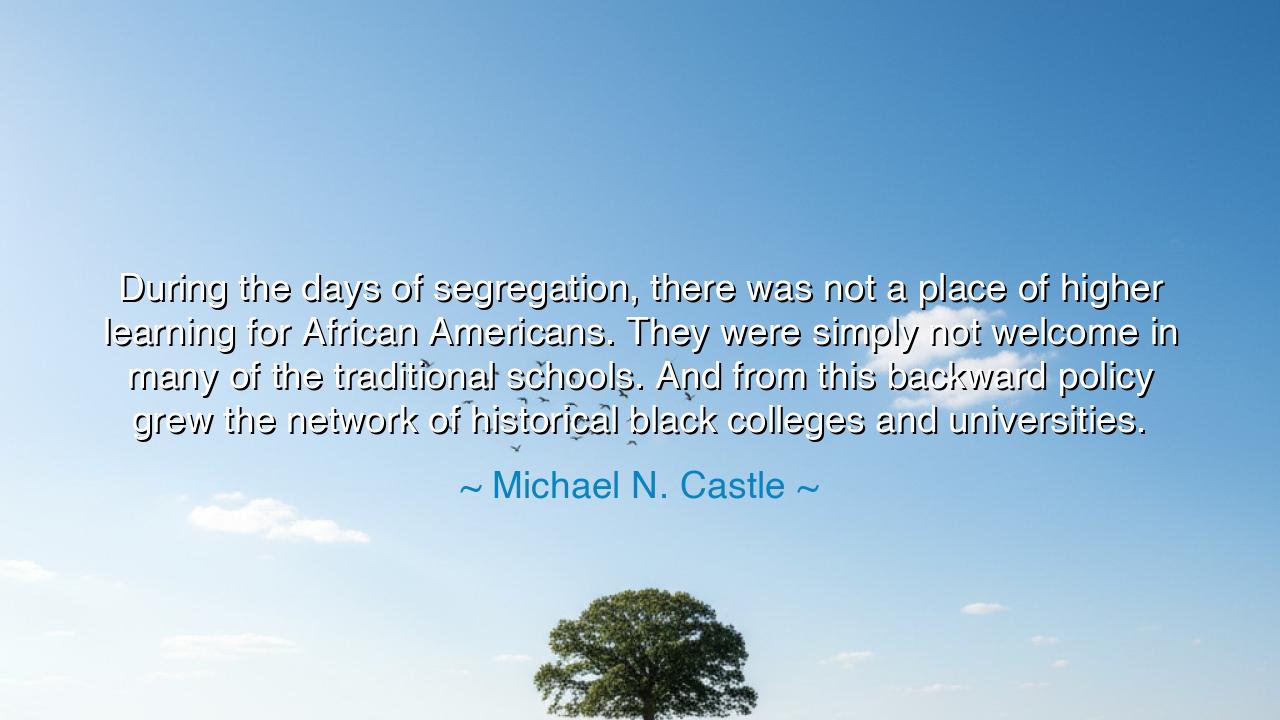
During the days of segregation, there was not a place of higher
During the days of segregation, there was not a place of higher learning for African Americans. They were simply not welcome in many of the traditional schools. And from this backward policy grew the network of historical black colleges and universities.






In the solemn and enlightening words of Michael N. Castle, we are reminded of a truth born from struggle and perseverance: “During the days of segregation, there was not a place of higher learning for African Americans. They were simply not welcome in many of the traditional schools. And from this backward policy grew the network of historical black colleges and universities.” These words are not mere reflection — they are a testament to the strength of the human spirit, to a people who, when denied the gates of one world, built another with their own hands. In them, we see how injustice can give birth to resilience, and how the thirst for learning becomes the seed of liberation.
In the days of segregation, the promise of education was a privilege reserved for the few — not a birthright for all. The halls of learning were closed to Black men and women, not for lack of brilliance or will, but because of a cruel and deliberate system that sought to deny them knowledge, the most powerful tool of freedom. But where the powerful built walls, the brave built doors. Out of exclusion was born creation — and thus arose the Historically Black Colleges and Universities, sanctuaries of thought, courage, and community. They were not born of convenience, but of necessity, carved from the stone of struggle and illuminated by the light of hope.
Michael N. Castle, in his quote, captures the paradox of progress — that even from the deepest injustice, humanity can forge beauty and strength. For the founders of HBCUs were visionaries who refused to accept silence. In the face of rejection, they did not wait for permission to learn; they created their own institutions, where minds could flourish freely and proudly. Schools like Howard University, Spelman College, and Tuskegee University rose not just as centers of education, but as beacons of dignity, where generations of African Americans learned not only to read and write, but to lead, to heal, to teach, and to transform the nation that had once sought to suppress them.
The story of Booker T. Washington stands as one of the most powerful examples of this truth. Born into slavery, he hungered for education even as a child who had to walk miles barefoot to learn his letters. He would one day found Tuskegee Institute, a place where the sons and daughters of the oppressed could become the builders of their own future. In his hands, a school became a revolution. Washington’s life echoed the very spirit that Castle describes — that from denial was born determination, and from exclusion came empowerment.
The ancients would say that adversity is the forge of greatness. And indeed, the network of HBCUs stands as a living monument to that ancient wisdom. They remind us that knowledge cannot be confined by prejudice, that truth cannot be silenced by law, and that the human longing to learn is as unstoppable as the tide. Where the world said “you are not welcome,” these institutions answered, “we will welcome ourselves.” In this way, they became not only schools of the mind, but temples of identity and pride, where the heritage of a people was reclaimed and celebrated.
Yet Castle’s words also serve as a warning — that the wounds of segregation still echo. Though the walls have fallen, their shadows remain. Thus, it falls to us, the inheritors of that struggle, to remember the price paid for access to knowledge, and to ensure that education remains a right, not a privilege. For every mind left in darkness, the world grows dimmer; for every student lifted into light, the world grows brighter.
So, my children of learning and legacy, take this lesson to heart: never take knowledge for granted, and never stop building spaces where all may learn freely. Honor the sacrifice of those who built their schools from nothing — and let their spirit live in your own pursuit of truth. For as Castle’s words remind us, even from the cruelest backward policy, greatness can rise — if there are those brave enough to learn, to teach, and to believe in the power of education to transform the world.
Thus, remember this truth, passed down from generations of struggle: “They were not welcome in the traditional schools, and so they built their own.” This is not only the story of HBCUs — it is the story of human endurance itself. May it remind you that when knowledge is denied, the wise do not despair; they create new light.






AAdministratorAdministrator
Welcome, honored guests. Please leave a comment, we will respond soon